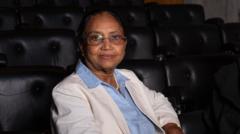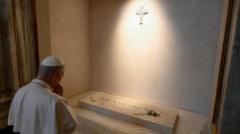"The collaboration between Banu Mushtaq and Deepa Bhasthi on ‘Heart Lamp’ has won the International Booker Prize, showcasing feminist narratives and enhancing the representation of Indian literature in English."
"Celebrating a Literary Milestone: 'Heart Lamp' Breaks Barriers in Translation"

"Celebrating a Literary Milestone: 'Heart Lamp' Breaks Barriers in Translation"
"Banu Mushtaq's groundbreaking collection, translated by Deepa Bhasthi, wins the prestigious International Booker Prize, marking a significant moment for translations from regional Indian languages."
In a historic moment for Indian literature, Banu Mushtaq’s short story collection, “Heart Lamp,” has made waves by becoming the first anthology to win the International Booker Prize. This groundbreaking achievement also signifies the first time a work translated from Kannada, a South Indian language, has been honored with this prestigious award.
What sets “Heart Lamp” apart in the realm of literary translation is its unique approach. Rather than translating a single existing book, translator Deepa Bhasthi meticulously selected stories from Ms. Mushtaq’s extensive body of work, which spans over three decades and comprises more than 60 stories previously published in Kannada-language journals. This author-translator collaboration not only highlights the empowerment of Bhasthi within the literary community but also reflects the evolving landscape of translation in India.
With more Indian voices reaching global audiences, the contributions of women writers and translators are gradually reshaping the narrative framework in English literature. “I have defied stereotypes throughout my life, and now my book has transcended those boundaries as well,” expressed 77-year-old Mushtaq in a recent interview. The stories within “Heart Lamp” delve into the complexities of women's lives, particularly focusing on the experiences of ordinary women and drawing attention to feminist themes.
Mushtaq’s credentials as an author, lawyer, and social activist enhance her narrative authority, advocating against social injustices and patriarchy. The significant aspects of “Heart Lamp” offer readers insight into the everyday encounters and struggles faced by many, including women from Muslim communities. The success of “Heart Lamp” not only enriches the English literary landscape but also paves the way for greater representation and appreciation of diverse voices from India.
What sets “Heart Lamp” apart in the realm of literary translation is its unique approach. Rather than translating a single existing book, translator Deepa Bhasthi meticulously selected stories from Ms. Mushtaq’s extensive body of work, which spans over three decades and comprises more than 60 stories previously published in Kannada-language journals. This author-translator collaboration not only highlights the empowerment of Bhasthi within the literary community but also reflects the evolving landscape of translation in India.
With more Indian voices reaching global audiences, the contributions of women writers and translators are gradually reshaping the narrative framework in English literature. “I have defied stereotypes throughout my life, and now my book has transcended those boundaries as well,” expressed 77-year-old Mushtaq in a recent interview. The stories within “Heart Lamp” delve into the complexities of women's lives, particularly focusing on the experiences of ordinary women and drawing attention to feminist themes.
Mushtaq’s credentials as an author, lawyer, and social activist enhance her narrative authority, advocating against social injustices and patriarchy. The significant aspects of “Heart Lamp” offer readers insight into the everyday encounters and struggles faced by many, including women from Muslim communities. The success of “Heart Lamp” not only enriches the English literary landscape but also paves the way for greater representation and appreciation of diverse voices from India.























